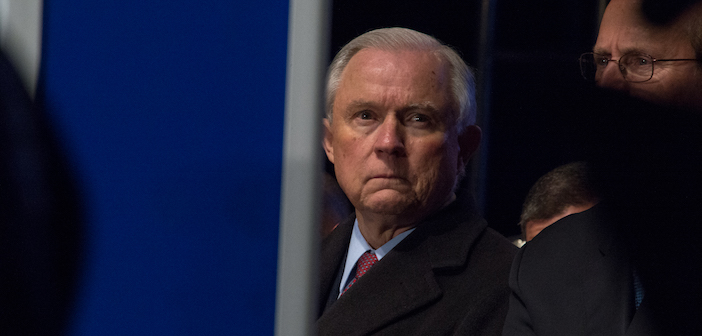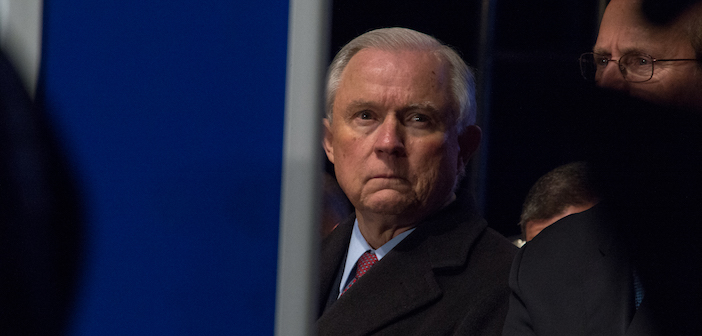
Anti-marijuana U.S. Attorney General Jeff Sessions tendered his resignation Nov. 7, 2018, one day after Republicans lost control of the House.
That left cannabis policy observers scrambling to find out where the temporary replacement at the top of the Department of Justice, Sessions’ Chief of Staff Matthew Whitaker, stands on marijuana.
Here’s what Marijuana Moment found in our initial review
During a 2014 primary debate for the Republican U.S. Senate nomination from Iowa, Whitaker sympathized with patients who benefit from marijuana ingredient cannabidiol (CBD). But, he also voiced concerns about the disconnect between state legalization efforts and the enforcement of federal law under the Obama administration.
During the debate hosted by Iowa Public Television, he was asked about the state’s recent passage of a CBD-only medical cannabis law.
“First of all, I know a couple of families that are going to be positively impacted by what has happened in the state senate today,” he said. “And I applaud them for helping those families who need that help.”
Whitaker then turned to the Justice Department’s marijuana policy under President Barack Obama’s attorney general, Eric Holder.
“But what we have is we have an attorney general that is telling state attorney generals [sic], ‘if you disagree with a law, you don’t have to enforce it.’ And I am gravely concerned that we are now going to go back and forth between who’s in the White House and what their drug enforcement policy is, and you’ll see under what we have now — where you have Colorado and other states legalizing it really with no federal interference — and then when we come back, we may have a different regulatory scheme.”
Well, then, what should Congress do to resolve those differences?
“I think Congress should regulate things that harm people, and that is the hard drugs and the like that dramatically hurt citizens, cause violent crime in our communities, and those should be regulated,” he said.
“But not marijuana?” the debate moderator asked.
“For me, I saw the impact of marijuana on our border,” he said, presumably referring to his time as a U.S. attorney. “And if you go to any of the counties in Texas where there’s an illegal importation of marijuana, there’s a tremendous amount of violence.”
Marijuana reform advocates have generally applauded the announcement of Sessions’ resignation, as the now former attorney general has a long history of demeaning cannabis consumers, disregarding research about the benefits of medical marijuana and upholding federal prohibition.
“Attorney General Jefferson Sessions was a national disgrace, NORML hopes he finds the time during his retirement to seek treatment for his affliction of 1950’s reefer madness,” NORML executive director Erik Altieri said in a press release.
Democratic Rep. Earl Blumenauer of Oregon called the move a “major step forward for marijuana reform,” also noting that Republican Rep. Pete Sessions of Texas, who has obstructed votes on marijuana-related legislation as chair of the House Rules Committee, was defeated in Tuesday’s midterm elections. The two are not related despite sharing the same last name and a disdain for cannabis.
Losing two Sessions, Jeff and Pete, in 24 hours is a major step forward for marijuana reform. https://t.co/ykR8eT8Rid
— Earl Blumenauer (@repblumenauer) November 7, 2018
However, there’s also an argument to be made that Jeff Sessions’ departure from the office could ultimately pose threats to the legal cannabis movement. Sessions and President Donald Trump have had a contentious relationship almost from the start of the administration, and the attorney general’s reluctance to crack down on legal cannabis states could theoretically be attributed, in part, to that dynamic. The next attorney general could enjoy some more flexibility when it comes to enforcing federal marijuana laws.
For his part, Republican Sen. Cory Gardner of Colorado tweeted Nov. 7, 2018, that he’s looking forward to “continuing to work with the president to fulfill his campaign position to leave the regulation of marijuana to the states.”
Trump has already said he’s actively pursuing a permanent replacement for Sessions, so it’s unclear what, if anything, Whitaker could achieve during his temporary stint as acting attorney general, or how long his tenure will last.
….We thank Attorney General Jeff Sessions for his service, and wish him well! A permanent replacement will be nominated at a later date.
— Donald J. Trump (@realDonaldTrump) November 7, 2018
This article has been republished from Marijuana Moment under a content syndication agreement. Read the original article here.











